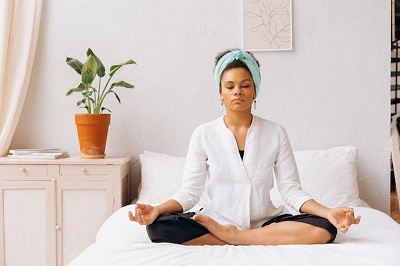Meditation for sleep is a powerful tool that can help you unwind, relax, and prepare your mind and body for a restful night. To maximize the benefits of this practice, it’s essential to know the best times to meditate. Here, we explore four optimal times to practice meditation for sleep and how it can enhance your nightly rest.
1. Before Bedtime
Meditating just before bedtime is one of the most effective ways to prepare your body and mind for sleep.
- Relaxation Ritual: Establishing a bedtime meditation routine can signal to your body that it’s time to wind down.
- Stress Reduction: Meditation helps reduce stress and anxiety accumulated throughout the day, promoting a calm state of mind.
- Improved Sleep Quality: Studies show that meditation before bed can improve sleep quality and duration.
Tips for Bedtime Meditation:
- Set a Regular Time: Choose a consistent time each night to meditate, helping to establish a routine.
- Create a Calm Environment: Dim the lights, use soft music or white noise, and ensure your space is comfortable and free from distractions.
- Focus on Breathing: Practice deep breathing exercises to slow your heart rate and relax your muscles.
2. After Dinner
Meditating after dinner, but before you start your evening activities, can help transition your body from the active part of the day to a more relaxed state.
- Digestive Aid: Meditation can aid digestion by reducing stress levels, which can interfere with your digestive system.
- Evening Wind-Down: This time frame allows you to process the day’s events and start unwinding early in the evening.
- Lower Stress Levels: Lowering stress in the evening can help prevent late-night anxiety and restlessness.
Tips for Post-Dinner Meditation:
- Light Physical Activity: A short walk or gentle stretching before meditation can help relax your body.
- Quiet Space: Find a quiet place away from the hustle and bustle of evening activities.
- Mindful Reflection: Use this time for mindful reflection on your day, letting go of any lingering stress.
3. Late Afternoon
The late afternoon is an excellent time for a brief meditation session to rejuvenate your energy levels and reduce pre-evening stress.
- Energy Boost: A short meditation session can provide a mental and physical energy boost, preventing the afternoon slump.
- Stress Relief: Reducing stress in the late afternoon can improve your mood and help you transition into a more relaxed evening.
- Preparation for Evening: It sets a peaceful tone for the rest of your day, making it easier to unwind later.
Tips for Late Afternoon Meditation:
- Short Sessions: Even 10-15 minutes of meditation can be beneficial.
- Focus Techniques: Use guided meditations or focus on breathwork to quickly center your mind.
- Comfortable Setting: Ensure you are in a comfortable and quiet environment, free from interruptions.
4. Early Morning
While this might seem counterintuitive, meditating in the early morning can set a positive tone for the day, ultimately leading to better sleep at night.
- Morning Calm: Starting your day with meditation can reduce overall stress and anxiety levels throughout the day.
- Mindfulness Practice: Morning meditation encourages mindfulness and presence, which can positively affect your mood and stress levels.
- Better Sleep Patterns: Establishing a regular meditation practice in the morning can improve your overall sleep patterns by reducing stress.
Tips for Morning Meditation:
- Consistent Routine: Meditate at the same time each morning to build a consistent habit.
- Simple Techniques: Focus on simple breathing exercises or mindfulness meditation to start your day calmly.
- Set Intentions: Use this time to set positive intentions for your day, promoting a calm and centered mindset.
Conclusion
Finding the best times to meditate for sleep can significantly enhance the quality of your rest. By integrating meditation into your daily routine, whether it’s before bedtime, after dinner, in the late afternoon, or early in the morning, you can create a peaceful and stress-free environment that promotes better sleep. Experiment with these times to discover what works best for you and enjoy the transformative benefits of meditation for sleep.
Additional Tips for Effective Sleep Meditation
- Consistency is Key: Regular practice is essential to experience the full benefits of meditation for sleep.
- Comfortable Environment: Ensure your meditation space is comfortable and conducive to relaxation.
- Guided Meditations: Use guided meditations designed for sleep to help you get started.
By practicing meditation at these optimal times, you can enhance your sleep quality and overall well-being, leading to a more restful and rejuvenating night’s sleep.





Comments